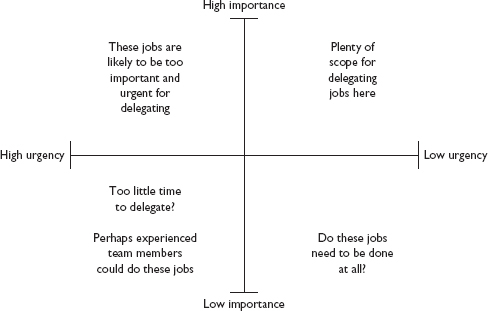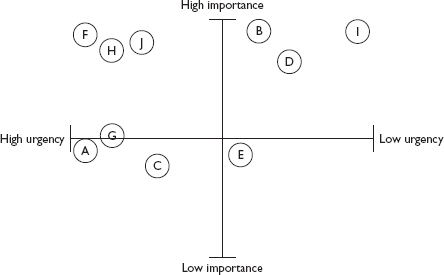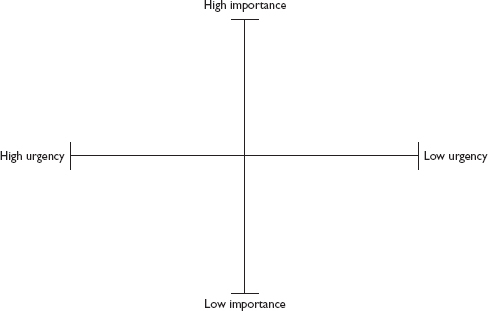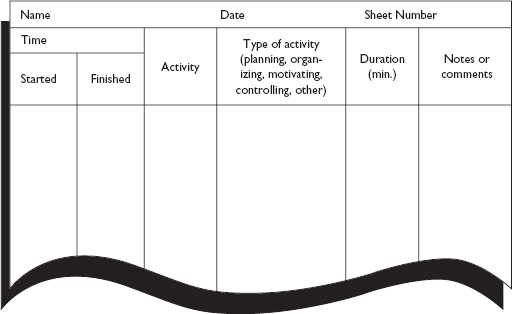Session C
Preparing to
delegate
 1 Introduction
1 Introduction
In this session and in Session D we examine the process of effective delegation and ask you to apply the process in your work by delegating a suitable task to one of your team members. If you are not yet in a position to delegate, you will still find it useful to work through the sessions now, but plan to work through them again when you come to delegate tasks.
The skills of delegation include knowing what to delegate and to which member of your workteam.
In this session we will look in general terms at what parts of a team leader's job can be delegated; then you will look at your own work to select particular tasks that you can delegate and select a real task which you want to delegate.
Delegation can be a way of demonstrating that you recognize the skills of a particular team member, or the enthusiasm and commitment they possess. Depending on the type of task you delegate, it can also be part of a system of rewards, for example, if you delegate a desirable task rather than one that may be low priority or routine.
The success of delegation depends to a large extent on your choosing the most appropriate person to take on the job. To make this judgement you must get to know the strengths and weaknesses of team members. In the second half of this session you will choose an appropriate team member for the delegated task.
 2 What should not be delegated?
2 What should not be delegated?
There are clearly parts of any manager's job that cannot be delegated. It is important to identify these activities first and separate them from the others. You can then look at these other jobs and assess which are most suitable for delegating.
Work which is of a confidential nature should not be delegated. Similarly, team leaders cannot delegate tasks for which they do not have the authority in the first place. Nor can they delegate all their authority, or they will have passed over the job altogether.
Your company regulations and policies may specify jobs which only you can do, or there may be procedures which only you can undertake.
Activity 22

Think about your own particular job and write down two things which you cannot delegate, and why this is.
Your answers will depend on your own circumstances, but here are some examples of work activities that you would not delegate:
![]() disciplinary action;
disciplinary action;
![]() counselling staff;
counselling staff;
![]() reviewing the performance of team members;
reviewing the performance of team members;
![]() your role in promoting health and safety at work;
your role in promoting health and safety at work;
![]() planning and organizing the work activities of the whole team.
planning and organizing the work activities of the whole team.
 3 What should be delegated?
3 What should be delegated?
We'll now consider which tasks you ought to delegate to your workteam.
Activity 23

You are the office manager in the editorial department of a publishing company. Much of the work in your department is done by freelance writers, editors, proofreaders, and page designers who work from home. The editorial manager wants to use the regular freelance staff more effectively. By finding out what sort of hardware and software each one uses, the various types of editorial jobs can be distributed more appropriately between them. The editorial manager asks you to do a short survey of the freelance staff, to see what equipment each one has, and which sorts of jobs they feel they are best equipped to do. The editorial manager also wants to increase the pool of design staff, and asks you to draw up a list freelance designers who might be suitable for the company.
You work out that the job involves:
![]() analysing the different sorts of editorial jobs, and the equipment and software needed for each;
analysing the different sorts of editorial jobs, and the equipment and software needed for each;
![]() investigating freelancer editors’ equipment and software;
investigating freelancer editors’ equipment and software;
![]() drawing up a summary of the sorts of editorial jobs each one is best fitted to do;
drawing up a summary of the sorts of editorial jobs each one is best fitted to do;
![]() deciding what the company's requirements are for freelance designers;
deciding what the company's requirements are for freelance designers;
![]() finding suitable freelance designers;
finding suitable freelance designers;
![]() pulling all the information together and writing a report.
pulling all the information together and writing a report.
You are already very busy doing the sort of work that only you can do, and you feel that this project will take up a lot of time that you could use more effectively.
Which parts of this job would you delegate to someone else, and which would you carry out yourself?
I would suggest that you could delegate to other people in your team:
![]() the responsibility for analysing the different sorts of jobs, and the equipment and software needed for each;
the responsibility for analysing the different sorts of jobs, and the equipment and software needed for each;
![]() surveying freelance editors’ equipment and software;
surveying freelance editors’ equipment and software;
![]() summarizing the sorts of editorial jobs each one is best fitted to do;
summarizing the sorts of editorial jobs each one is best fitted to do;
![]() finding freelance designers who are likely to be short-listed.
finding freelance designers who are likely to be short-listed.
You might want to check on the company's requirements for designers before someone else does the work of searching for suitable people. In addition, you will probably want to write the final report, although others might also contribute to it. The final decision about which designers might be interviewed is yours, as is the decision about which editorial jobs best suit which freelance editors.
You may have come up with different answers from these, but they are probably based on similar ideas.
You will probably agree that this project would be a useful opportunity for you to work with your workteam and show them that you have confidence in them. The project is interesting and it also enables you to do some work developing your team members. These factors make parts of the project highly suitable for delegation.
The kinds of jobs which are suitable for delegating may include the following:
![]() jobs which individual team members can do as well as or better than you;
jobs which individual team members can do as well as or better than you;
![]() jobs which serve to develop individuals;
jobs which serve to develop individuals;
![]() jobs which are of low to medium priority;
jobs which are of low to medium priority;
![]() jobs which are routine;
jobs which are routine;
![]() jobs which appeal to individual team members.
jobs which appeal to individual team members.
Let's look at each of these factors in turn.
3.1Jobs for which team members are competent
As a team leader you need to concentrate on the management activities of planning, organizing, motivating and controlling your workteam. Although you may like to do some of the technical work you were originally trained for, you should bear in mind that your team members are closer to the actual work than you. Therefore, they are likely to have ready access to the information needed to do the job. So you can delegate the parts of a job, often the technical parts, which another member of the workteam can do just as well as, if not better than, you.
For this kind of job you are building on the existing competence of team members, making the most of their existing strengths. Indeed, this is an important way of using delegation.
However, you should also consider delegating tasks which will help team members develop competence.
3.2Developmental jobs
As a team leader you have a responsibility to make sure your team members are skilled and experienced to do the work of the team both now and in the future. You also want to build a team that is well-motivated. For this you need to develop individual team members so that they are able to meet current and future demands. Investing in team members through development activities shows that you value their contribution.
Delegation is a valuable technique here. It allows you to share some of your interesting work, and thus show your trust in your team. It is also an effective way of developing people. The work carried out as part of delegation contributes to the work of the section, so is intrinsically useful. But by the end of the delegation process, the team member should have learned new things which he or she can go on to apply and use.
When you identify jobs that will help develop team members, you need to consider whether you can give them access to the resources necessary to do these jobs properly. Although you can allocate many resources, bear in mind that some – for example, information or particular expertise – cannot always be allocated or made easily accessible.
So consider aspects of your work which may be done by a member of your workteam, who would see them as interesting or challenging, a break in their own routine and an opportunity to develop new skills and experience.
Delegation carried out with these issues in mind can strengthen and empower an individual, because their enthusiasm and commitment have been recognized in a practical way.
3.3Medium to low priority jobs
Most team leaders have more work to do than they have time for, and so they tend to organize their work according to priority. They focus on jobs which are urgent and important; in other words high priority jobs. The jobs they leave until last and which may not even get done, are those of lower priority. They may be important, but not urgent, or they may be of relatively low importance. It is these jobs which can be usefully delegated to others.
The chart below shows how jobs may be prioritized according to their importance and urgency, and how far jobs falling into different areas of the chart could be delegated.

High importance/high urgency Team leaders are likely to want to do these jobs themselves. The jobs have to be done well and they are needed soon, so there is perhaps not enough time to delegate effectively.
High importance/low urgency The jobs in this category will become urgent if they are not done now. They are likely to be suitable for delegating as there is time to plan, monitor and review the job. By delegating relatively important jobs, the team leader is demonstrating trust and confidence in the team member. The fact that these jobs are important also suggests that they may be used to develop staff.
Low importance/high urgency Team leaders may feel that they don't have time to delegate jobs in this category, and that it is quicker to do them themselves. But if team members already have experience in doing these jobs, then the time taken to delegate again will not be great and team leaders can focus on more important work.
Low importance/low urgency If the job is not important and not urgent, team leaders may question whether the job has to be done at all. However, where jobs still need to be done, they can be effectively delegated to team members.
There are some key advantages in delegating work of lower priority.
![]() You ensure that these jobs are done.
You ensure that these jobs are done.
![]() You will have time to go through the delegation process thoroughly with jobs that are not urgent. This will be especially necessary when the jobs themselves are important or when you are delegating to an inexperienced team member.
You will have time to go through the delegation process thoroughly with jobs that are not urgent. This will be especially necessary when the jobs themselves are important or when you are delegating to an inexperienced team member.
![]() When you delegate jobs that are of medium to low importance, you will have more time to focus on those which you consider are important.
When you delegate jobs that are of medium to low importance, you will have more time to focus on those which you consider are important.
3.4Routine jobs
As a team leader you will have responsibility for carrying out a range of routine jobs, for example, monitoring and regular reporting. It makes sense to delegate some of these activities to team members, so that they develop the skills and experience to do these jobs themselves. Delegation here helps to increase team member involvement in the overall work of the section, and can foster appreciation of the purpose and importance of routine activities – which can sometimes seem pointless and time-consuming to team members.
3.5Attractive jobs
Although not all the tasks that are worth delegating appeal to team members it is worth including some which are generally seen as desirable. Such jobs can be used to reward staff for good performance. Here is an example.
An international company which has a large workforce based in France regularly sends groups of managers to the UK in order to improve their use of English. They are based at a language school in Bath for two weeks at a time and, although it is a working course, it is also viewed by those who come as a very pleasant trip. Each time a group comes over, which is about every three months, a member of the company's training department comes with them. Sometimes the head of training comes with the group herself, but often she sends other members of her department instead. Partly this is to improve their own English language, but it is also an example of her willingness to delegate some of the attractive parts of her job.
Activity 24

We have looked at some of the kinds of jobs which may be suitable for delegation. Now relate these to your own work. Select two tasks you currently carry out which fit into each of the categories of job listed below. Your tasks can fall into more than one category.
Tasks which team members can do as well as or better than you.
Tasks which serve to develop individuals.
Tasks which are of low to medium priority.
Tasks which are routine.
Tasks which appeal to team members.
The tasks which you have identified may all be suitable for delegation. However, you may also find that those which are most suitable for delegation fall into more than one category. For example, we would argue that a task which is of medium priority and which will also help to develop staff is a prime candidate for delegation.
 4 Delegating to volunteers
4 Delegating to volunteers
As a manager, you may well have a responsibility for developing the skills and experience of volunteers. But you can only delegate to volunteers to the extent that they want to accept. With paid employees, you have the last resort of being able to instruct them to do something, but you don't have this option with volunteers. In fact, you have to keep them positively interested and committed all the time or you will lose them. While paid employees may tell you that they are not happy, volunteers are more likely just to stop coming.
It is therefore critically important to share what are seen to be the attractive and sought after tasks equally and fairly. You need to get to know which tasks volunteers regard as attractive. Some volunteers may be keen to acquire new skills and new experiences which will stand them in good stead for paid work in other areas. But you may also find that a particular youth club activity or a shift that fits in well with school hours represent the coveted jobs.
 5 Which of your tasks can you delegate?
5 Which of your tasks can you delegate?
A work diary is a useful way of finding out the activities we carry out at work.
Activity 25

Complete your work diary twice a day over at least three fairly typical working days.
Keep the recording system as simple as possible, so that you really do use it. For example, use a log sheet something like the one shown below.
| EXTENSION 2 Making a record of all your work activities may be time-consuming, but it is often very revealing – not only for planning delegation, but also for time management. Extension 2 looks at how to use your time wisely. |
Many people are surprised when they review their work diaries to discover how they actually spend their time. Many find there is much greater scope for delegation than they first thought. |
Activity 26 |
 |
When you have collected the information about how you spend your time, you then need to analyse it.
First of all separate all the activities which you need to deal with yourself. These may be tasks that come under the headings of planning or organizing work and motivating and controlling your workteam, or tasks which your organization requires you to do yourself.
Now put the rest of the tasks under the following headings. They may fall under more than one heading.
| Team members competent to do | Developmental | Low to medium priority | Routine | Attractive |
You should find that most of the tasks under these headings are suitable for delegation. Circle the ones which you now feel you should have delegated.
Your work in this Activity shows the potential scope for delegating parts of your recent work. You are likely to find that if you had delegated some of your work, you would have had more time to spend on more important tasks.
To decide which of your current tasks you can delegate, you have to work out priorities.
Activity 27

 |
This Activity is the first in a series of eleven Activities for which your responses may together form the basis of evidence for your S/NVQ portfolio. If you are intending to take this course of action, it might be better to write your answers on separate sheets of paper. |
Make a ‘To do’ list for the next three to five days. Write down all the things you need to do in the space below.
When you have done this, analyse your list.
Write an ‘S’ besides those which you feel only you can do.
Write a ‘D’ next to all those that you immediately feel you can delegate.
One way of sorting out your priorities is to place each job in the appropriate place on a chart showing scales of importance and urgency, like the one shown earlier (page 50).
Let's see how this works by looking at a case study.
On Tuesday evening before leaving work, Sandra Wilkinson drew up the following list of tasks which she needed to do the next day. She wrote comments beside each one. The list of tasks was as follows.
| Job | Comments |
| A Arrange farewell presentation | For Thursday lunchtime |
| B Answer memo from the general manager | Task delegated to me by my boss |
| C Complete return for the finance department | Already delayed through my having to wait for information |
| D Prepare information for computer input | Deadline 5 p.m. Friday |
| E Check suppliers’ acceptance of new specification | Should be done before new contract starts |
| F Prepare unfair dismissal case for industrial tribunal | Must be suitable for my boss to present by Friday |
| G Write up minutes of team meeting | Promised for Thursday |
| H Complete report on accident which happened yesterday | Statutory requirement: must complete while fresh in my mind |
| I Collect/analyse information about results of quality improvement project | Needed for report to my boss by end of month |
| J Prepare briefing to team on new contract | Briefing meeting Thursday |
Sandra first identified those tasks which she felt only she could do. These were: B, F, H and J.
Then she rated the tasks according to their importance and urgency in the following chart.

With this information, Sandra decided that in order to get the tasks done she needed to delegate some of her work.
She decided to delegate parts of task A, although she would have to plan what to say. She also felt tasks D, E and I would be developmental tasks which various members of her team would benefit from doing. She decided to ask an experienced team member to write up the team meeting minutes (Task G) – he had done the job once before. Finally, she thought that it would not take her long to complete the return for finance, and she thought that although urgent, she could delay the job until Thursday, if necessary. Of the tasks which she had to do herself, she felt she could delay task B, but the others had to be done on Wednesday.
Activity 28

 |
This Activity is the second in a series of eleven Activities for which your responses may together form the basis of evidence for your S/NVQ portfolio. If you are intending to take this course of action, it might be better to write your answers on separate sheets of paper. |
This Activity asks you to use the importance/urgency matrix to put your tasks in order of priority.
Make a list of the tasks which you labelled ‘D’ in Activity 22 and give each one a letter starting from A. We've given you space for up to ten tasks, but you can add more if you choose.
A _______________________________________________________
B _______________________________________________________
C _______________________________________________________
D _______________________________________________________
E _______________________________________________________
F _______________________________________________________
G _______________________________________________________
H _______________________________________________________
I _______________________________________________________
J _______________________________________________________
Now prioritize them by placing them in appropriate positions in the chart below.

This prioritizing of tasks should show you tasks which you need to carry out yourself and which ones may be suitable for delegating. Now consider which of these tasks:
![]() staff are competent to do;
staff are competent to do;
![]() are developmental;
are developmental;
![]() are routine;
are routine;
![]() are attractive to do.
are attractive to do.
I hope you have seen that prioritizing your work according to importance and urgency helps you to see where you need to direct your efforts and your opportunities for delegating.
Activity 29

 |
This Activity is the third in a series of eleven Activities for which your responses may together form the basis of evidence for your S/NVQ portfolio. If you are intending to take this course of action, it might be better to write your answers on separate sheets of paper. |
Select a job which you want to delegate to a team member. It may be one of those which you identified in Activity 27 or Activity 28.
As you work through the rest of the workbook you will go through the process of planning and controlling the delegation. So you should choose a job that is reasonably challenging and interesting.
Briefly describe the job here.
Now describe the benefits of delegating this job:
![]() to you as team leader;
to you as team leader;
![]() to the person who will be carrying out the delegated task;
to the person who will be carrying out the delegated task;
![]() to the organization.
to the organization.
 6 Selecting a team member for delegation
6 Selecting a team member for delegation
All of your team members can benefit from delegation, and you should look for opportunities to delegate to everyone in your team. But if you have a particular job to delegate, you need to think about who is the ‘right’ person to do the job.
This involves considering the requirements of the job and the needs of your team members. Let's look at the requirements of the job first.
There are four questions to ask.
![]() What experience, expertise, skills and attitudes are needed to do the job? The job may require a high level of technical know-how or previous experience, which only certain members of your team possess.
What experience, expertise, skills and attitudes are needed to do the job? The job may require a high level of technical know-how or previous experience, which only certain members of your team possess.
![]() How urgent is the job? If you need the job done urgently, you will have less time to spend briefing and supporting an inexperienced team member. You may want to delegate an urgent job to someone who has done a similar task before, and who is already competent to do it.
How urgent is the job? If you need the job done urgently, you will have less time to spend briefing and supporting an inexperienced team member. You may want to delegate an urgent job to someone who has done a similar task before, and who is already competent to do it.
![]() What are the consequences of missing deadlines, or making mistakes? By thinking about the importance of getting the job right first time and the deadline for completing it, you can judge the level of risk you are prepared to take in giving the task to someone who has never done it before.
What are the consequences of missing deadlines, or making mistakes? By thinking about the importance of getting the job right first time and the deadline for completing it, you can judge the level of risk you are prepared to take in giving the task to someone who has never done it before.
![]() What is the most economical way of getting the job done?
What is the most economical way of getting the job done?
Let's look at an example to explain this last point.
Activity 30 |
 |
Bill Pearce, a team leader of a graphics design shop, was complaining to his boss that he found himself spending a large part of his working day using the photocopying machine.
If you were Bill's manager, how would you recommend Bill overcomes the problem?
You may agree that managers who spend much of their time photocopying materials are not using their time cost effectively. Surely the task could more often be given to somebody whose time represents a lower cost to the organization? The activity shows how particular jobs are often done at a totally uneconomic rate.
Sometimes you may decide it is worth using more resources in delegating a job than absolutely necessary, especially if you plan to use delegation for team development.
This takes us on to thinking about who among the team members is the best person to carry out the job.
We have seen that you may want to delegate tasks to team members who are already competent to carry them out. In this way you are acknowledging and making use of the expertise and skills of team members. However, it is not always appropriate to select the person whose skills and experience are the most suitable for the job.
Delegation is an important technique for developing competence across your team. As a manager you need to be thinking about developing your team members so that they are able to meet the current challenges of their work, and are prepared to meet future challenges. So it may be a good idea to delegate a particular job to someone who needs to learn how to do it as part of a development programme, or to gain further experience in carrying out a task of which he or she already has limited knowledge.
Again there are a number of questions to ask.
![]() Who will find the job challenging and/or interesting?
Who will find the job challenging and/or interesting?
![]() Who will benefit from taking on the job?
Who will benefit from taking on the job?
![]() Who has the skills, expertise and attitudes needed to do the job?
Who has the skills, expertise and attitudes needed to do the job?
![]() Who has carried out a similar job before?
Who has carried out a similar job before?
![]() Who do you think has the necessary skills, but has not yet used them for a job like this?
Who do you think has the necessary skills, but has not yet used them for a job like this?
![]() Who could do the job with some coaching or help from another member of the team?
Who could do the job with some coaching or help from another member of the team?
| Bear in mind that delegation can be used as part of training and development. |
|
Activity 31 |
 |
 |
This Activity is the fourth in a series of eleven Activities for which your responses may together form the basis of evidence for your S/NVQ portfolio. If you are intending to take this course of action, it might be better to write your answers on separate sheets of paper. |
This Activity helps you to work out the best person to take on the job you have chosen to delegate.
First consider the requirements of the job, and write notes under the headings below.
Skills, expertise and attitudes required.
How urgent the job is.
Consequences of not getting it right.
Most cost-effective way of doing the job.
Now think about your team members by answering the following questions.
Who will find the job challenging and/or interesting?
Who will benefit from taking on the job?
Who has the skills, expertise and attitudes needed to do the job?
Who has carried out a similar job before?
Who has the necessary skills, but has not yet used them for a job like this?
Who could do the job with some coaching or help from another member of the team?
Who is available to do the job?
Can you reorganize someone's work so that he or she becomes available to take on the job?
Is this job suitable as a form of reward or recognition? If so, to whom might it be delegated for this purpose?
In the light of your comments about the job itself and your team members, who is the best person to do the job?
I hope you agree that the systematic approach taken in this activity helps you to take account of all the angles when selecting the most suitable person to carry out a delegated task.
You may find it useful to adopt a similar approach when you are preparing to delegate other tasks.
| EXTENSION 4 Extension 4 looks at how to delegate tasks to your team, rather than simply to individuals. |
By now you should have chosen a suitable task for delegating and selected the most appropriate person to do the job. You have gone through the stages of preparing for delegation. In the next session you will be carrying out the delegation. |
Self-assessment 3

Here is a list of tasks which a manager has drawn up.
a See Carole about being late in to work. | |
b Deal with staff grievance. | |
c Investigate the problem with no. 2 machine – used by operators. | |
d Write up minutes of team meeting. | |
e Organize date, place and time for quality improvement project meeting. | |
f Brief supplier on new product specification. | |
g Prepare month's production figures for manager. | |
h Liaise with training about team's health and safety needs. |
1 Tick those which you think may be suitable for delegating.
2 Which ones are definitely unsuitable for delegating and why?
3 Why might you delegate a task to a team member who has not had experience in doing the task?
4 Why might you delegate a task to a team member who has the expertise and experience in doing the task?
Answers to these questions can be found on page 105.
7 Summary
![]() You cannot delegate all your work. Examples of work you cannot delegate include:
You cannot delegate all your work. Examples of work you cannot delegate include:
![]() work of a confidential nature;
work of a confidential nature;
![]() activities your organization requires you to carry out yourself;
activities your organization requires you to carry out yourself;
![]() work which you do not have the authority to delegate.
work which you do not have the authority to delegate.
![]() Jobs which you can delegate to others include those:
Jobs which you can delegate to others include those:
![]() which can be done just as well by a member of your workteam;
which can be done just as well by a member of your workteam;
![]() for which a member of your workteam is technically more able, or has easier access to the relevant information;
for which a member of your workteam is technically more able, or has easier access to the relevant information;
![]() which help to develop team members and which may be interesting and/or challenging;
which help to develop team members and which may be interesting and/or challenging;
![]() of medium or low priority;
of medium or low priority;
![]() which are routine;
which are routine;
![]() which are attractive, and may be part of your system of recognition and reward to team members.
which are attractive, and may be part of your system of recognition and reward to team members.
![]() If you manage volunteers, you must keep them committed and motivated to do the work. This may mean offering them new experiences and opportunities to develop new skills, but it may also mean getting to know the coveted jobs and allocating them fairly and equally.
If you manage volunteers, you must keep them committed and motivated to do the work. This may mean offering them new experiences and opportunities to develop new skills, but it may also mean getting to know the coveted jobs and allocating them fairly and equally.
![]() To find the right person to do a job, you need to consider first the requirements of the job, and then the needs of your team members.
To find the right person to do a job, you need to consider first the requirements of the job, and then the needs of your team members.
![]() In considering the requirements of the job, think about the following.
In considering the requirements of the job, think about the following.
![]() The skills and expertise needed to do the job.
The skills and expertise needed to do the job.
![]() The importance and urgency of the job.
The importance and urgency of the job.
![]() The degree of risk you are able to take.
The degree of risk you are able to take.
![]() The most cost-effective way of doing the job.
The most cost-effective way of doing the job.
![]() The right person for the job may be:
The right person for the job may be:
![]() the person with the necessary skills, expertise and experience;
the person with the necessary skills, expertise and experience;
![]() someone who has the skills and expertise, but has not yet had experience in doing the job;
someone who has the skills and expertise, but has not yet had experience in doing the job;
![]() someone whose skills you want to develop through delegating;
someone whose skills you want to develop through delegating;
![]() someone who has the time to do the work, or whose workload can be reorganized so they are available to do it;
someone who has the time to do the work, or whose workload can be reorganized so they are available to do it;
![]() a person whose work and commitment you would like to recognize and/or reward in a practical way.
a person whose work and commitment you would like to recognize and/or reward in a practical way.

